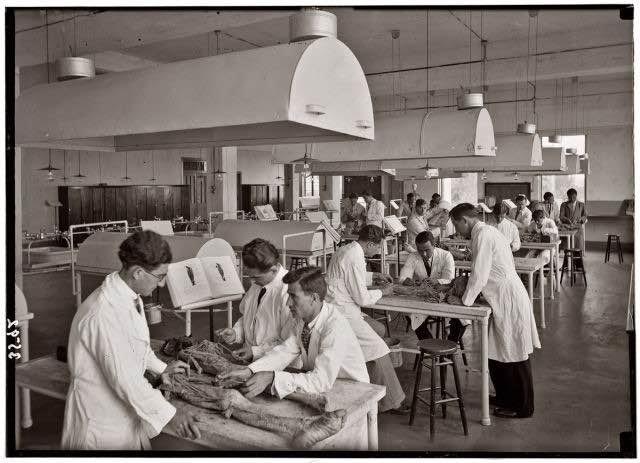Medical Students – a symbol of dedication
Medical students are different. You can’t compare future physicians to future engineers, teachers, or lawyers. To become a medical doctor, you spend countless nights in an anatomy lab when all your friends are enjoying parties, dancing, or sports. Medical students don’t have time for precious moments; they study chemistry, biology, and  microbiology.
microbiology.
I remember in Soviet medical school when we did not have protection gloves. We would hold parts and organs of cadavers in our hands without any fastidiousness. Not only did we hold body parts in our hands, but we also cut or sliced them open to find out what was inside. Imagine slicing the intestine to see the anatomical details and it appeared to be full of feces. It happened all the time and it was normal for us. We usually did not have enough time for lunch or dinner so we ate in the anatomic lab. One hand held an organ or bone and in the other was a spoon, fork, or sandwich.
During the biochemistry exam at the end of the second year of medical school, a professor asked me to check the urine for sugar. I was supposed to pick up the right reagent from a shelf and drop it into the bottle with urine. Depending on the color change, I had to tell if the urine contains sugar or not. The problem was that I did not know what the right reagent for sugar was. So, a professor said, “In order to pass this test, you have to tell me if urine contains sugar or not. It is too bad that you don’t know how to do it the right way, but you always have a plan B. Taste it. If it is sweet, then it contains sugar. I don’t care how you analyze this urine, but if you can give me the correct answer – you passed this exam.”
He left me no choice because I needed to pass all exams with a B average to receive a scholarship for the next 6 months. So, I did taste it and it wasn’t sweet at all, and my answer that the specimen contained no sugar was correct, and I passed. Later that day I met my professor again and he smiled and he told me that it wasn’t real urine; it was just lightly colored water with some salt dissolved into it for lab purposes only.
How much dedication should medical students show to taste urine, to touch cadaver’s organs and body parts, to enter the rooms in which patients with the scariest and most contagious diseases are isolated from the public (plague, leprosy, cholera, anthrax, etc.) without special antibacterial suits?
Medical students experience no fastidiousness
Later in our clinic, medical students were expected to perform rectal and vaginal examinations without gloves. Our instructors told us that gloves limit the sensitivity of the tips of the fingers, which we need to diagnose nodes on a prostate gland during rectal exams and the opening and smoothness of the cervix during gynecological exams.
Every year, the education involved in medical schools becomes more interesting. The general theoretical subjects (biology, physic, chemistry, pharmacology, etc.) are left behind and students spend their time in clinics, seeing real patients with real diseases. Students who plan to be in surgical fields assist surgeons during operations, future gynecologists help in the labor and delivery department, and students interested in internal medicine see patients in cardio, pulmonary, and GI clinics.
It was during this time that I met a beautiful girl and we fell in love.